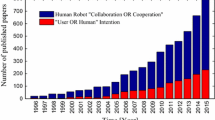Abstract
A robot is a coupled nonlinear system, which heavily depends on the trajectory tracking to perform the desired task. Therefore, to make the robot follow the desired trajectory with the use of controllers has become an onerous task. In this paper, a novel application of large deviation theory to control a nonlinear dynamical robotic system is presented. The torque input is considered to be corrupted with Poisson and Gaussian noise. The large deviation principle is applied to find the approximate small-amplitude exit probability of the noisy trajectory from the desired defined boundaries. Afterward, the exit probability is used to discover the optimal controller coefficients acceptable for specified boundaries. The designed controller limits the exit of the trajectory under the desired range. Evaluation of proposed approach is presented through the stability and performance analysis. Finally, the presented research is experimentally validated using MATLAB simulations with different trajectories and implemented on commercially available Omni bundle robot.





















Similar content being viewed by others
Data Availability Statement
All related data are available in the manuscript.
References
Boomeri, V., Tourajizadeh, H.: Design, modeling, and control of a new manipulating climbing robot through infrastructures using adaptive force control method. Robotica (2020). https://doi.org/10.1017/S0263574719001814
Corke, P.: Robotics, Vision & Control, vol. 118. Springer International Publishing, Berlin (2017). https://doi.org/10.1007/978-3-319-54413-7
Mosavi, A., Qasem, S.N., Shokri, M., Band, S.S., Mohammadzadeh, A.: Fractional-order fuzzy control approach for photovoltaic/battery systems under unknown dynamics. Var. Irradiat. Temp. Electron. 9, 1455 (2020). https://doi.org/10.3390/electronics9091455
Mohammadzadeh, A., Rathinasamy, S.: Energy management in photovoltaic battery hybrid systems: a novel type-2 fuzzy control. Int. J. Hydrogen Energy 45(41), 20970–20982 (2020). https://doi.org/10.1016/j.ijhydene.2020.05.187. (ISSN 0360-3199. 10.1016)
Hao, Y., Duan, Z., Wen, G.: Controllability and observability of an n-link robot with multiple active links. Int. J. Robust. Nonlinear Control 27, 4633–4647 (2017). https://doi.org/10.1002/rnc.3822
Herzallah, R.: Probabilistic control for uncertain systems. ASME. J. Dyn. Syst. Meas. Control 134(2), 021018 (2012). https://doi.org/10.1115/1.4005370
Todorov, E., Li, Weiwei.: A generalized iterative LQG method for locally-optimal feedback control of constrained nonlinear stochastic systems. In: Proceedings of the 2005, American Control Conference, 2005., Portland, OR, USA, 2005, pp. 300–306 vol. 1
Herzallah, R.: Generalised probabilistic control design for uncertain stochastic control systems. Asian J. Control 20, 2065–2074 (2012). https://doi.org/10.1002/asjc.1717
Asselborn, Leonhard, Stursberg, Olaf: Probabilistic control of uncertain linear systems using stochastic reachability. IFAC-PapersOnLine 48(14), 167–173 (2015). https://doi.org/10.1016/j.ifacol.2015.09.452
Bandyopadhyay, S., Chung, S., Hadaegh, F.Y.: Probabilistic and distributed control of a large-scale swarm of autonomous agents. IEEE Trans. Rob. 33(5), 1103–1123 (2017)
Tang, Z.Q., Heung, H.L., Tong, K.Y., Li, Z.: A probabilistic model-based online learning optimal control algorithm for soft pneumatic actuators. IEEE Robot. Autom. Lett. 5(2), 1437–1444 (2020)
Chung, Y.M., Rivera-Letelier, J., Takahasi, H.: Large deviation principle in one-dimensional dynamics. Invent. Math. 218, 853–888 (2019). https://doi.org/10.1007/s00222-019-00899-w
Bouchet, F., Laurie, J., Zaboronski, O.: Langevin dynamics, large deviations and instantons for the quasi-geostrophic model and two-dimensional Euler equations. J. Stat. Phys. 156, 1066–1092 (2014). https://doi.org/10.1007/s10955-014-1052-5
Kraaij, R.: Large deviations for finite state Markov jump processes with mean-field interaction via the comparison principle for an associated Hamilton-Jacobi equation. J. Stat. Phys. 164, 321–345 (2016). https://doi.org/10.1007/s10955-016-1542-8
Agraz, P.T.: Borel measurability and large deviations for fuzzy random variables. Fuzzy Sets Syst. 157(19), 2558–2568 (2006). https://doi.org/10.1016/j.fss.2005.03.014
Bercu, B., Richou, A.: Large deviations for the Ornstein–Uhlenbeck process with shift. Adv. Appl. Probab. 47(3), 880–901 (2015). https://doi.org/10.1239/aap/1444308886
Chiarini, A., Fischer, M.: On large deviations for small noise Itô processes. Adv. Appl. Probab. 46(4), 1126–1147 (2014). https://doi.org/10.1239/aap/1418396246
Pfister, C.E., Sullivan, W.G.: Large deviations estimates for dynamical systems without the specification property. Appl. \(\beta \)-shifts Nonlinearity 18, 237–261 (2004). https://doi.org/10.1088/0951-7715/18/1/013
Dembo, A., Zeitouni, O.: Large Deviations Techniques and Applications, 2nd edn. Springer, Berlin (2010). https://doi.org/10.1007/978-3-642-03311-7
Chen, W.-H., Ballance, D.J., Gawthrop, P.J., O’Reilly, J.: A nonlinear disturbance observer for robotic manipulators. IEEE Trans. Ind. Electron. 47(4), 932–938 (2000). https://doi.org/10.1109/41.857974
Rana, R., Gaur, P., Agarwal, V., Parthasarathy, H.: Tremor estimation and removal in robot-assisted surgery using lie groups and EKF. Robotica (2019). https://doi.org/10.1017/S0263574719000341
Dupuis, P., Ellis, R.S.: A Weak Convergence Approach to the Theory of Large Deviations, p. xviii+479. A Wiley-Interscience Publication, New York (1997). https://doi.org/10.1002/9781118165904
Li, N., Lei, Y., Guo, L., Yan, T., Lin, J.: Remaining useful life prediction based on a general expression of stochastic process models. IEEE Trans. Industr. Electron. 64(7), 5709–5718 (2017)
Shynk, John J.: Chapter 7, Probability, Random Variables, and Random Processes: Theory and Signal Processing Applications. Wiley, Hoboken (2012).. (ISBN: 978-1-11-39395-68)
Spong, Mark W.: S Hutchinson and M. Robot Modeling and Control. Wiley, Hoboken, Vidyasagar (2005).. (ISBN: 978-0-471-64990-8)
Ziegler, J.G., Nichols, N.B.: Optimum settings for automatic controllers. J. Dyn. Syst., Meas. Control 115(2), 220–222 (1993). https://doi.org/10.1115/1.2899060
Rana, R., Agarwal, V., Gaur, P., Parthasarathy, H.: Design of optimal UKF state observer-controller for stochastic dynamical systems. IEEE Trans. Ind. Appl. 57(2), 1840–1859 (2021). https://doi.org/10.1109/TIA.2020.3048647
Varadhan, S. R. S.: Large deviations. Courant Lect. Notes 27, 104, 2016. https://bookstore.ams.org/cln-27
Singla, R., Parthasarathy, H., Agarwal, V., Rana, R.: Feedback optimization problem for master-slave teleoperation tracking in the presence of random noise in dynamics and feedback. Nonlinear Dyn. 86, 559–586 (2016). https://doi.org/10.1007/s11071-016-2908-9
Chen, L., Wang, Q.: Prescribed performance-barrier Lyapunov function for the adaptive control of unknown pure-feedback systems with full-state constraints. Nonlinear Dyn. 95, 2443–2459 (2019). https://doi.org/10.1007/s11071-018-4704-1
Funding
This research received no grant from any funding agency in the public, commercial, or not-for-profit sectors.
Author information
Authors and Affiliations
Corresponding author
Ethics declarations
Conflict of interest
The authors declare that they have no conflict of interest.
Additional information
Publisher's Note
Springer Nature remains neutral with regard to jurisdictional claims in published maps and institutional affiliations.
Rights and permissions
Springer Nature or its licensor holds exclusive rights to this article under a publishing agreement with the author(s) or other rightsholder(s); author self-archiving of the accepted manuscript version of this article is solely governed by the terms of such publishing agreement and applicable law.
About this article
Cite this article
Rana, R., Singla, R. & Parthasarathy, H. Robotic controller design for sporadic events using large deviations theory. Nonlinear Dyn 110, 2481–2499 (2022). https://doi.org/10.1007/s11071-022-07758-z
Received:
Accepted:
Published:
Issue Date:
DOI: https://doi.org/10.1007/s11071-022-07758-z




